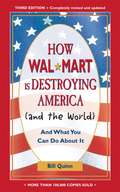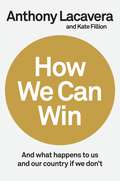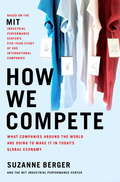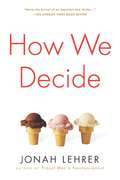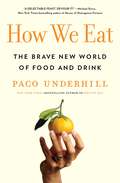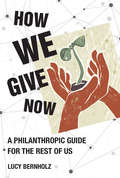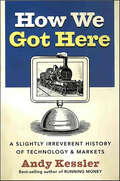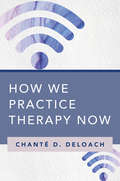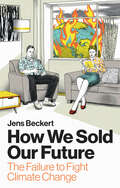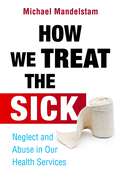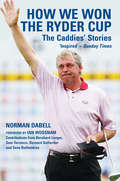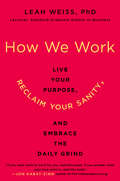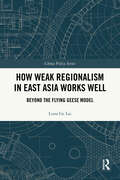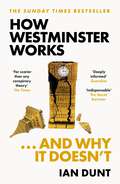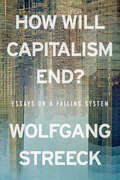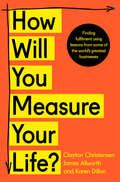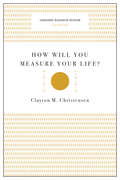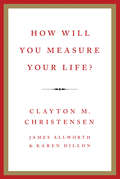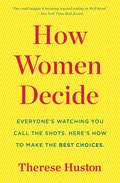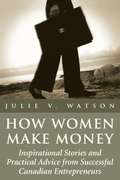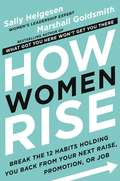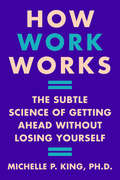- Table View
- List View
How Walmart Is Destroying America (And the World): And What You Can Do about It
by Bill QuinnAfter carving up the once lovingly cared-for downtowns of Small Town America, Wal-Mart launched a frontal assault on mom-and-pop businesses all over the globe. With 1.5 million employees operating more than 3, 500 stores, Wal-Mart is now the world'¬?s largest private employer. In this third edition of How Wal-Mart Is Destroying America (and the World), intrepid Texas newspaperman Bill Quinn continues the fight. Featuring detailed accounts of Wal-Mart'¬?s questionable business practices and the latest information on Wal-Mart lawsuits, vendor issues, and efforts to stop expansion, Quinn shows why Wal-Mart Stores, Inc., is arguably the most feared and despised corporation in the world. Whether you'¬?re a customer fed up with Wal-Mart'¬?s false claims, a vendor squeezed by strong-arm tactics, a worker pushed to increase the Waltons'¬? bottom line, or a concerned citizen trying to save your hometown, this book will show you how to get Wal-Mart off your back and out of your backyard.BILL QUINN is a World War II veteran, retired newspaperman, and certified anti-Wal-Mart crusader. He lives with his wife, Lennie, in Grand Saline,Texas.From the Trade Paperback edition.
How We Can Win: And What Happens to Us and Our Country If We Don't
by Anthony Lacavera Kate FillionOur kids are smart, our banks are sound, our health care system is humane, our democracy is stable—but technological change is about to disrupt our economy and threaten our way of life. Canadians aren’t ready for the race to the future. Can we still catch up—or even win?Yes, says Anthony Lacavera, one of Canada’s most successful entrepreneurs and venture capitalists. But weneed to change the way we think and talk about our own abilities—dream bigger, aim higher and go for gold, not bronze. We also need to change the way we do business. Our dominant business culture, Lacavera believes, is fundamentally unCanadian: traditional, backward-looking, insular, timid, greedy, unoriginal—everything that Canadians themselves are not. And that unCanadian business culture, protected by outmoded regulations and government policies, is stifling our economic growth. It dumps roadblocks in the path of entrepreneurs who want to build the kind of powerhouse businesses that will create jobs and fuel our economy. Anthony Lacavera faced those roadblocks himself, when he was building WIND—an epic battle against the big three telecommunications giants in Canada. But he’s certain we have the talent and the brains to tear those roadblocks down. He gives us vivid portraits of some of Canada’s most important natural resources: our talented, innovative entrepreneurs, who want to change the world for the better (and, yes, make money while they’re at it). But we are shipping far too many of them to the United States, gift-wrapped in our tax dollars. They don’t want to leave—they’re forced out because it’s just too difficult to build big, bold businesses in Canada. How We Can Win explains what we need to do to keep them here, and what all Canadians must do to ensure our future prosperity. Our biggest problem is not that we are a small country, but that we think too small. We can be a nation of big dreamers and bigger doers. Not by aping Silicon Valley, but by focusing on uniquely Canadian strengths and then doubling down on them. If we bet aggressively on ourselves, and our future, rather than clinging to the status quo, we will create a new, more solid economic foundation—one that allows us to win the race to the future without leaving home.
How We Compete
by Suzanne Berger the MIT Industrial Performance CenterOver the past three years, Americans have come to fear that no job in the United States is safe. Which--if any--will remain in this country? If America loses its manufacturing base, can research, design, and services be far behind?
How We Decide
by Jonah LehrerThe first book to use the unexpected discoveries of neuroscience to help us make the best decisionsSince Plato, philosophers have described the decision-making process as either rational or emotional: we carefully deliberate, or we "blink" and go with our gut. But as scientists break open the mind's black box with the latest tools of neuroscience, they're discovering that this is not how the mind works. Our best decisions are a finely tuned blend of both feeling and reason--and the precise mix depends on the situation. When buying a house, for example, it's best to let our unconscious mull over the many variables. But when we're picking a stock, intuition often leads us astray. The trick is to determine when to use the different parts of the brain, and to do this, we need to think harder (and smarter) about how we think.Jonah Lehrer arms us with the tools we need, drawing on cutting-edge research as well as the real-world experiences of a wide range of "deciders"--from airplane pilots and hedge fund investors to serial killers and poker players.Lehrer shows how people are taking advantage of the new science to make better television shows, win more football games, and improve military intelligence. His goal is to answer two questions that are of interest to just about anyone, from CEOs to firefighters: How does the human mind make decisions? And how can we make those decisions better?
How We Eat: The Brave New World of Food and Drink
by Paco UnderhillAn &“eye-opening&” (Kirkus Reviews) and timely exploration of how our food—from where it&’s grown to how we buy it—is in the midst of a transformation, showing how this is our chance to do better, for us, for our children, and for our planet, from a global expert on consumer behavior and bestselling author of Why We Buy.Our food system is undergoing a total transformation that impacts how we produce, get, and consume our food. Market researcher and bestselling author Paco Underhill—hailed by the San Francisco Chronicle as &“a Sherlock Holmes for retailers&”—reveals where our eating and drinking lives are heading in his &“delectable&” (Michael Gross, New York Times bestselling author of 740 Park) book, How We Eat. In this upbeat, hopeful, and witty approach, How We Eat reveals the future of food in surprising ways. Go to the heart of New York City where a popular farmer&’s market signifies how the city is getting country-fied, or to cool Brooklyn neighborhoods with rooftop farms. Explore the dreaded supermarket parking lot as the hub of innovation for grocery stores&’ futures, where they can grow their own food and host community events. Learn how marijuana farmers, who have been using artificial light to grow a crop for years, have developed a playbook so mainstream merchants like Walmart and farmers across the world can grow food in an uncertain future. Paco Underhill is the expert behind the most prominent brands, consumer habits, and market trends and the author of multiple highly acclaimed books, including Why We Buy. In How We Eat, he shows how food intersects with every major battle we face today, from political and environmental to economic and racial, and invites you to the market to discover more.
How We Give Now: A Philanthropic Guide for the Rest of Us
by Lucy BernholzFrom Go Fund Me to philanthropy: the everyday ways that we can give our money, our time, and even our data to help our communities and seek justice.In How We Give Now, Lucy Bernholz shows that philanthropy is more than writing a check and claiming a tax deduction. For most of us--the non-wealthy givers--philanthropy can be a way of living our values and fully participating in society. We give in all kinds of ways--shopping at certain businesses, canvassing for candidates, donating money, and making conscious choices with our retirement funds. We give our cash, our time, and even our data to make the world a better place. Bernholz takes readers on a tour of the often-overlooked worlds of participatory philanthropy, learning from a diverse group of forty resourceful givers. Donating our digitized personal data is an emerging form of philanthropy, and Bernholz describes safe, equitable, and effective ways of doing so--giving genetic data for medical research through a nonprofit genetics organization rather than a commercial one, for example, or contributing photographs to an online archive like the Densho Digital Repository, which documents America's internment of 120,000 Americans of Japanese descent. Bernholz tells us to "follow the money," however, when we're asked to "add a dollar" to our total at the cash register, or when we buy a charity-branded product; it's more effective to give directly than to give while shopping. Giving is a form of participation. Philanthropy by the rest of us--across geographies and cultural traditions--begins with and builds on active commitment to our communities.
How We Got Here: A Slightly Irreverent History of Technology & Markets
by Andy KesslerBest-selling author Andy Kessler ties up the loose ends from his provocative book, Running Money, with this history of breakthrough technology and the markets that funded them.Expanding on themes first raised in his tour de force, Running Money, Andy Kessler unpacks the entire history of Silicon Valley and Wall Street, from the Industrial Revolution to computers, communications, money, gold and stock markets. These stories cut (by an unscrupulous editor) from the original manuscript were intended as a primer on the ways in which new technologies develop from unprofitable curiosities to essential investments. Indeed, How We Got Here is the book Kessler wishes someone had handed him on his first day as a freshman engineering student at Cornell or on the day he started on Wall Street. This book connects the dots through history to how we got to where we are today.
How We Practice Therapy Now
by Chanté D. DeLoachEssential approaches to clinical practice for today’s out-of-office world. Future psychotherapy is not confined to the office: it can be online, virtual, wellness-oriented, flexible, racially conscious, and in service of public wellness. COVID-19 has forever changed the landscape of psychotherapy in these ways, and in ways we have yet to discover. Practicing psychologist Chanté D. DeLoach invites readers to reflect on the state of psychotherapy and emerging potentialities forged through crisis. She presents key concepts of telemental health, concierge therapy, and other out-of-office approaches to psychological well-being. DeLoach provides step-by-step guidance on getting started in telemental health, and points to clinical, ethical, and legal considerations for clinicians working in a digital space and other nontraditional formations. Topics covered include: how to screen clients for the appropriateness of teletherapy; the required equipment and infrastructure, demystifying the different online platforms; ways to set up a warm and inviting online office, and legal and ethical issues of remote therapy. It also considers business and practice management issues such as what to include in an informed consent for teletherapy. Important discussions of race, intersectionality, and justice in teletherapy round out the book. Readers will be invited to critically reflect on their own identities and comfort in integrating the challenging issues of race, power, and privilege in clinical work. Through interwoven examples and reflective exercises, Dr. DeLoach provides tools to support practitioners as they reimagine their clinical identities to meet the needs of today’s clients. This book offers keen insights and learning for all clinicians, from trainees to seasoned practitioners, who are embarking on this new terrain.
How We Sold Our Future: The Failure to Fight Climate Change
by Jens BeckertFor decades we have known about the dangers of global warming. Nevertheless, greenhouse gas emissions continue to increase. How can we explain our failure to take the necessary measures to stop climate change? Why are societies, despite the mounting threat to ourselves and our children, so reluctant to take action?In this important new book, Jens Beckert provides an answer to these questions. Our apparent inability to implement basic measures to combat climate change is due to the nature of power and incentive structures affecting companies, politicians, voters, and consumers. Drawing on social science research, he argues that climate change is an inevitable product of the structures of capitalist modernity which have been developing for the past 500 years. Our institutional and cultural arrangements are operating at the cost of destroying the natural environment and attempts to address global warming are almost inevitably bound to fail. Temperatures will continue to rise and social and political conflicts will intensify. The tragic truth is: we are selling our future for the next quarterly figures, the upcoming election results, and today’s pleasure. Any realistic climate policy needs to focus on preparing societies for the consequences of escalating climate change and aim at strengthening social resilience to cope with the increasingly unstable natural world. Civil society is the only source of pressure that could build the necessary strength and support for climate protection.How We Sold Our Future is a crucial intervention into the most pressing issue of our time.
How We Treat the Sick
by Michael MandelstamNo official statistics are kept for the number of hospital patients, in particular older people, who are subjected to neglect and abuse. That is, left malnourished and dehydrated, in pain, allowed to develop agonising and fatal pressure sores, not taken to the toilet, left to lie in their own bodily waste, cared for in a filthy environment and at risk of infection, ignored, allowed to fall over repeatedly, not spoken to, left naked or dressed in other patients' clothes - and discharged from hospital prematurely. This book bears witness to all these practices and more. Setting out a wealth of evidence not previously brought together, Michael Mandelstam shows beyond question that neglectful care is a systemic blight, rather than mere local blemish, within our health services. He analyses the causes and factors involved, reveals the widespread denial and lack of accountability on the part of those responsible - and spells out the political, moral, professional and legal implications of this failure to care for the most vulnerable of patients with humanity and compassion. Most important, Mandelstam points to the main obstacles to a solution - and to how they can be removed and change be accomplished. This book should be read by anyone concerned with the state of our health services, including National Health Service users, government policy makers and planners, public health practitioners and academics and researchers.
How We Won the Ryder Cup: The Caddies' Stories
by Norman DabellThe Ryder Cup battle between Europe and the USA is one of the biggest events in the golfing calendar and in 2006, the former underdogs showed they are now the dominant force in the biennial matches. It was another marvellous example of teamwork, and the caddies have played no small part in Europe overcoming the odds. The players hit the shots; their trusty caddies share the hopes, the glory and, occasionally, the misery.What was it like being beside Sam Torrance when he holed the winning putt and shed his tears on that historic moment at The Belfry in 1985? Fast forward to 2006 and a highly emotional appearance by Darren Clarke. What was it like being by his side? What was the story behind Colin Montgomerie's right-hand-man returning to his bag to help lay to rest the ghost of 1999? How do you cope when Seve Ballesteros is in full cry against the 'old enemy', especially when you are an American yourself? In 1991, a spike mark cost Europe the tournament, but what really happened behind the ropes? Who knew his man had had a vision he would beat Tiger Woods in 1997 - and saw it come true? What was it like witnessing those awful scenes at Brookline up close and personal in 1999? Who knew exactly which line to take when Paul McGinley sank his memorable winning putt in 2002?How We Won the Ryder Cup covers all the drama that has unfolded in the competition over the years and includes the action from the 2006 tournament at The K Club, County Kildare in Ireland, which saw Europe storm to a third successive victory.
How We Work: Live Your Purpose, Reclaim Your Sanity, and Embrace the Daily Grind
by Leah WeissA practical guide to bringing our whole selves to our professional work, based on the author’s overwhelmingly popular course at the Stanford Graduate School of Business.In today’s workplace, the traditional boundaries between "work" and "personal" are neither realistic nor relevant. From millennials seeking employment in the sharing economy to Gen Xers telecommuting to Baby Boomers creating a meaningful second act, the line that separates who we are from the work we do is blurrier than ever.The truth is, we don’t show up for our jobs as a portion of ourselves—by necessity, we bring both our hearts and our minds to everything we do. In Take This Job And Love It, mindfulness expert and creator of the perennially-waitlisted Stanford Business School course "Leading with Mindfulness and Compassion" Dr. Leah Weiss explains why this false dichotomy can be destructive to both our mental health and our professional success.The bad news, says Weiss, is that nothing provides more opportunities for negative emotions—anxiety, anger, envy, fear, and paranoia, to name a few—than the dynamics of the workplace. But the good news is that these feelings matter. How we feel at and about work matters—to ourselves, to the quality of our work, and ultimately to the success of the organizations for which we work.The path to productivity and success, says Weiss, is not to change jobs, to compartmentalize our feelings, or to create a false "professional" identity—but rather to listen to the wisdom our feelings offer. Using mindfulness techniques, we can learn how to attend to difficult feelings without becoming subsumed by them; we can develop an awareness of our bigger picture goals that orients us and allows us to see purpose in even the most menial tasks. In Take This Job And Love It, Weiss offers a set of practical, evidence-based strategies for practicing mindfulness in the real world, showing readers not just how to survive another day, but how to use ancient wisdom traditions to sharpen their abilities, enhance their leadership and interpersonal skills, and improve their satisfaction.
How Weak Regionalism in East Asia Works Well: Beyond the Flying Geese Model (ISSN)
by Luna Ge LaiThis book investigates the reasons why regionalism in East Asia has been much weaker than in Western Europe and North America. It focuses particularly on economic factors, examining the regional and global linkages of production networks.Through a focused exploration of regional and global production networks, it argues that East Asia was not as regionally concentrated as was Western Europe or North America, lacking a regionally oriented productional basis to support the institutional arrangement of East Asia as a stand-alone economic community. Moreover, the regional production networks of each national economy in the region are influenced by a different set of value-added components from different global and regional origins. This divergence in their positions accounts for the mushrooming of divergent initiatives and projects for regional institutional arrangement. Finally, the institutional choices of the states to join Comprehensive and Progressive Agreement for Trans-Pacific Partnership (CP/TPP) and/or Regional Comprehensive Economic Partnership (RCEP) are found to be strongly influenced by the sectoral focuses and priorities of their economies.Demonstrating how the unique economic factors of each nation override other considerations for greater regional integration, this book will be a valuable resource to students and scholars of international trade, Asian politics and economics.
How Wealth Rules the World: Saving Our Communities and Freedoms from the Dictatorship of Property
by Ben G. PriceCrackdowns on local democracy are accelerating, as corporate and state interests continue efforts to repress social movements. In this well-timed book, Ben Price presciently reveals structures of power and law that facilitate blatant corporate supremacy in the United States. Price uses his years of experience as a community organizer and a careful reading of history to show how a legal paradigm that facilitated slavery and the fossil fuel economy has endured and adapted over time – today barricading our communities and squelching dissent.Many books have been written about wealth, power and politics in the United States. Most of them make intuitive sense. Wealthy people use their power to influence and control politics. But Ben Price's new book is often counterintuitive as he explores how wealth itself is imbued with power. He answers questions such as:How is the American Legislative Exchange Council – a modern states' rights, free market capitalist group – the intellectual and political descendant of George Washington's Federalist Party?How was the Fourteenth Amendment that emancipated African American slaves from their status as property used by a reactionary Supreme Court to grant legal "personhood" to private corporations?How are cities seen under our legal doctrine as "public corporations," devoid of real governing authority?Further, Price identifies key counterrevolutions in U.S. history that squelched the transformative potential of the Civil War and American Revolution, and traces the roots of colonial and imperial systems of control. He links them to modern "free trade" agreements and other antidemocratic structures used to supersede democracy to this day.For some, this will come as no surprise. For others, it will be a rude, though necessary, awakening. "The white man's municipalities are just reservations, like ours," said a resident of Pine Ridge Reservation, who Price spoke with. "The difference is, we know we live on reservations. The white man doesn't."Crucially, Price shares insight into how social movements can plant seeds of a new legal system that makes the liberty, civil rights and dignity of humans and ecosystems its ultimate purpose. In fact, he introduces the reader to people who are doing just that.
How Westminster Works . . . and Why It Doesn't: The instant Sunday Times bestseller from the ultimate political insider
by Ian DuntWhy do some prime ministers manage to get things done, while others miserably fail? What is a 'special adviser' and how did they take over British political life? And why is the House of Lords more functional than most people think?Most of us have a sense that our political system doesn't seem to work, but struggle to articulate exactly why. And for good reason: our political and financial institutions are cloaked in secrecy, archaic terminology, ancient custom and impenetrable jargon. Now, expert political journalist Ian Dunt is lifting the lid on British politics to expose every aspect of the setup in a way that can be understood and challenged. From Downing Street to Whitehall, the Commons to the Lords, this book is an indispensable guide to our political system - and how we might begin to fix it.
How Westminster Works . . . and Why It Doesn't: The instant Sunday Times bestseller from the ultimate political insider
by Ian DuntWhy do some prime ministers manage to get things done, while others miserably fail? What is a 'special adviser' and how did they take over British political life? And why is the House of Lords more functional than most people think?Most of us have a sense that our political system doesn't seem to work, but struggle to articulate exactly why. And for good reason: our political and financial institutions are cloaked in secrecy, archaic terminology, ancient custom and impenetrable jargon. Now, expert political journalist Ian Dunt is lifting the lid on British politics to expose every aspect of the setup in a way that can be understood and challenged. From Downing Street to Whitehall, the Commons to the Lords, this book is an indispensable guide to our political system - and how we might begin to fix it.
How Will Capitalism End?: Essays on a Failing System
by Wolfgang StreeckThe provocative political thinker asks if it will be with a bang or a whimperIn How Will Capitalism End? the acclaimed analyst of contemporary politics and economics Wolfgang Streeck argues that capitalism is now in a critical condition. Growth is giving way to secular stagnation; inequality is leading to instability; and confidence in the capitalist money economy has all but evaporated. Capitalism's shotgun marriage with democracy since 1945 is breaking up as the regulatory institutions restraining its advance have collapsed, and after the final victory of capitalism over its enemies no political agency capable of rebuilding them is in sight. The capitalist system is stricken with at least five worsening disorders for which no cure is at hand: declining growth, oligarchy, starvation of the public sphere, corruption and international anarchy.In this arresting book Wolfgang Streeck asks if we are witnessing a long and painful period of cumulative decay: of intensifying frictions, of fragility and uncertainty, and of a steady succession of 'normal accidents'.From the Hardcover edition.
How Will You Measure Your Life? (Harvard Business Review Classics)
by Clayton M. ChristensenIn the spring of 2010, Harvard Business School’s graduating class asked HBS professor Clay Christensen to address them-but not on how to apply his principles and thinking to their post-HBS careers. The students wanted to know how to apply his wisdom to their personal lives. He shared with them a set of guidelines that have helped him find meaning in his own life, which led to this now-classic article. Although Christensen’s thinking is rooted in his deep religious faith, these are strategies anyone can use.Since 1922, Harvard Business Review has been a leading source of breakthrough ideas in management practice. The Harvard Business Review Classics series now offers you the opportunity to make these seminal pieces a part of your permanent management library. Each highly readable volume contains a groundbreaking idea that continues to shape best practices and inspire countless managers around the world.
How Will You Measure Your Life?: With Award-winning Harvard Business Review Article How Will You Measure Your Life?
by Clayton M. Christensen Karen Dillon James AllworthIn 2010 world-renowned innovation expert Clayton M. Christensen gave a powerful speech to the Harvard Business School's graduating class. Drawing upon his business research, he offered a series of guidelines for finding meaning and happiness in life. He used examples from his own experiences to explain how high achievers can all too often fall into traps that lead to unhappiness. The speech was memorable not only because it was deeply revealing but also because it came at a time of intense personal reflection: Christensen had just overcome the same type of cancer that had taken his father's life. As Christensen struggled with the disease, the question "How do you measure your life?" became more urgent and poignant, and he began to share his insights more widely with family, friends, and students. In this groundbreaking book, Christensen puts forth a series of questions: How can I be sure that I'll find satisfaction in my career? How can I be sure that my personal relationships become enduring sources of happiness? How can I avoid compromising my integrity--and stay out of jail? Using lessons from some of the world's greatest businesses, he provides incredible insights into these challenging questions. How Will You Measure Your Life? is full of inspiration and wisdom, and will help students, midcareer professionals, and parents alike forge their own paths to fulfillment.
How Will the Patient Protection and Affordable Care Act Affect Liability Insurance Costs?
by Paul Heaton David I. Auerbach Ian BrantleyThe Patient Protection and Affordable Care Act (ACA) will greatly expand private coverage and Medicaid while making major changes to payment rates and the health care delivery system. These changes will affect traditional health insurers, individuals, and government payers. In addition, a considerable amount of health care is paid for directly by or is indirectly paid for via legal settlements after the care occurs, by liability insurers. This report identifies potential mechanisms through which the ACA might affect claim costs for several major types of liability coverage, especially auto insurance, workers' compensation coverage, and medical malpractice. The authors discuss the conceptual basis for each mechanism, review existing scholarly evidence regarding its importance, and, where possible, develop rough estimates of the size and direction of expected impacts as of 2016. They examine how each mechanism might operate across different liability lines and discuss how variation across states in legal rules, demographics, and other factors might moderate each mechanism's operation. Overall, expected short-term effects of the ACA appear likely to be small relative to aggregate liability insurer payouts in the markets in question. However, under reasonable assumptions, some mechanisms can generate potential cost changes as high as 5 percent or more in particular states and insurance lines. The authors also discuss longer-run changes that could be fostered by the ACA that might exert more significant effects on insurance claim costs, including shifts in tort law, changes in physician supply, new pricing approaches under the accountable care organization model, and changes in population health.
How Women Decide: What's True, What's Not, And Why It Matters
by Therese Huston&“An authoritative guide to help women navigate the workplace and their everyday life with greater success and impact&” (Forbes). So, you&’ve earned a seat at the table. What happens next? We all face hard decisions every day—and the choices we make, and how others perceive them, can be life changing. There are countless books on how to make those tough calls, but How Women Decide is the first to examine a much overlooked truth: Men and women reach verdicts differently, and often in surprising ways. Stress? It makes women more focused. Confidence? Caution can lead to stronger resolutions. And despite popular misconceptions, women are just as decisive as men—though they may pay for it. Pulling from the latest science on decision-making, as well as lively stories of real women and their experiences, cognitive scientist Therese Huston teaches us how we can better shape our habits, perceptions, and strategies, not just to make the most of our own opportunities, but to reform the culture and bring out the best results—regardless of who&’s behind them.
How Women Make Money: Inspirational Stories and Practical Advice from Canadian Women
by Julie V. WatsonHow Women Make Money is an inspiring collection of profiles, anecdotes, and practical advice and guides that will help women take control of their lives and attain their financial goals. Whether you are starting a new business, growing an established one, supplementing a pension, working for "extras" for the family, or striving to fulfill a lifelong dream, this book will nurture your entrepreneurial spirit and give you the tools you need to achieve success.
How Women Rise: Break the 12 Habits Holding You Back from Your Next Raise, Promotion, or Job
by Marshall Goldsmith Sally HelgesenReady to take the next step in your career . . . but not sure what's holding you back? Read on. Leadership expert Sally Helgesen and bestselling leadership coach Marshall Goldsmith have trained thousands of high achievers--men and women--to reach even greater heights. Again and again, they see that women face specific and different roadblocks from men as they advance in the workplace. In fact, the very habits that helped women early in their careers can hinder them as they move up. Simply put, what got you here won't get you there . . . and you might not even realize your blind spots until it's too late. Are you great with the details? To rise, you need to do less and delegate more. Are you a team player? To advance, you need to take credit as easily as you share it. Are you a star networker? Leaders know a network is no good unless you know how to use it. Sally and Marshall identify the 12 habits that hold women back as they seek to advance, showing them why what worked for them in the past might actually be sabotaging their future success. Building on Marshall's classic best seller What Got You Here Won't Get You There, their new book How Women Rise is essential reading for any woman who is ready to advance to the next level.
How Work Works: The Subtle Science of Getting Ahead Without Losing Yourself
by Michelle P. KingA unique and revelatory guide to understanding and navigating the unwritten rules of the workplace—the key to achieving success, finding meaning, and staying true to your authentic self in today’s business world—from the organizational expert and celebrated author of The Fix.In her two decades researching organizations, Michelle King has discovered that people who succeed possess a particularly unique skill: They know how workplaces work. More specifically, to get ahead, they do not rely on the often generic and outdated written formal rules that for a century have defined the workplace. Instead, they have learned to gauge how they should behave and perform by becoming aware of informal (and unspoken) rules that exist just below the surface, rather than “formal” organizational guidelines. In this one-of-a-kind guide, King offers her proprietary framework based on over ten years of research and hundreds of employees who reached leadership positions. By focusing on five key areas -- navigating informal networks; developing self-awareness and awareness of others; learning the skills you need to be adaptive to changing conditions; getting support for your next promotion; and finding meaning and fulfillment at work—King teaches every professional how to understand and make these systems work for them and achieve their career ambitions.The new world of work requires a new way of working. With more people vying for top positions, a volatile unpredictable global workplace, and an ever-evolving landscape, it is increasingly important for employees to understand how to negotiate the unspoken and intangible elements of workplace culture.. In How Work Works, King dispels old myths and provides keen observations about what it means to find belonging, build networks, manage the informal and ultimately thrive at work.
